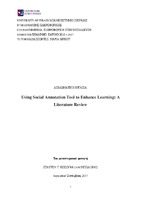Using social annotation tool to enhance learning: a literature review
| dc.contributor.advisor | Βίρβου, Μαρία | |
| dc.contributor.author | Κόσσυφας, Σταύρος Γ. | |
| dc.date.accessioned | 2018-03-14T11:19:44Z | |
| dc.date.available | 2018-03-14T11:19:44Z | |
| dc.date.issued | 2017-09 | |
| dc.identifier.uri | https://dione.lib.unipi.gr/xmlui/handle/unipi/11079 | |
| dc.format.extent | 17 | el |
| dc.language.iso | el | el |
| dc.publisher | Πανεπιστήμιο Πειραιώς | el |
| dc.rights | Attribution-NonCommercial-NoDerivatives 4.0 Διεθνές | * |
| dc.rights.uri | http://creativecommons.org/licenses/by-nc-nd/4.0/ | * |
| dc.title | Using social annotation tool to enhance learning: a literature review | el |
| dc.type | Master Thesis | el |
| dc.contributor.department | Σχολή Τεχνολογιών Πληροφορικής και Επικοινωνιών. Τμήμα Πληροφορικής | el |
| dc.description.abstractEN | Social annotation tools are used more often in contemporary learning processes in order to boost learning. Nowadays, plenty models, types and applications have been created that facilitate annotation to online documents, web pages, even multimedia. The primary purpose of all these twenty-four applications, that are analyzed herein, is to stimulate reading comprehension and offer a more interesting virtual learning environment, that can benefit both tutors and learners. The main criteria that have been selected for comparing the reviewed annotation tools are effectiveness, usability and knowledge dissemination. Finally, it is believed that there are many opportunities to improve the existing models, as well as to create brand new models. | el |
| dc.contributor.master | Πληροφορική | el |
| dc.subject.keyword | e-Learning | el |
| dc.subject.keyword | Annotation tools | el |
| dc.subject.keyword | Information technology | el |
| dc.date.defense | 2017 |
Αρχεία σε αυτό το τεκμήριο
Αυτό το τεκμήριο εμφανίζεται στις ακόλουθες συλλογές
-
Τμήμα Πληροφορικής
Department of Informatics



